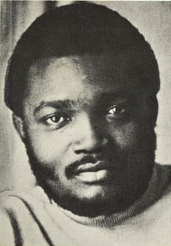Franco Luambo
Franco Luambo Makiadi (born July 6, 1938 in Sona Bata , Central Congo as L'Okanga Landju Pene Luambo Makiadi or François Luambo Makiadi ; † October 12, 1989 in Brussels ) was a well-known singer, guitarist and band leader from Congo-Zaire.
Live and act
Franco (as he was mostly called without a surname) was taught from the age of 12 by Ebengo Dawayon, a solo guitarist in the band "Watam". He recorded his first own single in 1953 with "Watam"; she became a success and he was persuaded to appear on live shows. At the end of the 50s, alongside Dr. Nico, authoritative guitarist of early Congolese pop music. As early as 1956 he played jazz with the initially medium-format Orchester Kinois , with which he worked for the rest of his life. OK Jazz , as the band was abbreviated, was a homage to the city of Kinshasa , where the history of Congolese rumba music began; In 1957 the band played in Brazzaville . Later the abbreviation TP was added to the name. That means "Tout puissant", ie: the "almighty". As such, he and TPOK Jazz would make an impact on the Congo music scene over the years. Although TPOK Jazz no jazz music played, they used the term jazz, to show that their music modern, cultured and was thoroughly entertaining. Over the decades, numerous musicians have played in the big band , which grew to 23 musicians , who later took on a central position like Essous, Wuta May, Fan Fan Josky or Papa Noel.
In the early years Franco mainly played a fast variety of rumba. He soon adopted elements of local and traditional music. Over time, the songs took on a different shape. In terms of format, the pieces from the late seventies onwards are reminiscent of James Brown's funk : They use a repetitive, never tiring riff and on this basis often fill half or an entire LP page.
Franco did not always sing alone, but often had lead and guest vocalists in his bands such as Simaro , Vicky Longomba , Sam Mangwana , Madilu System and even his rival Tabu Ley Rochereau , with whom he sang in a duet. In addition to numerous well danceable rumba and soukous pieces, in which he could be heard as a guitarist, he sang beautiful ballads again and again - mostly in Lingála , but sometimes also in French . In his songs he devoted himself to the description of everyday life in Africa , in which women appeared ubiquitous - later political and satirical pieces were added. “Le Grand Maître”, the great master, is one of the attributes attached to him. Between Guinea and Zambia, between Cameroon and Kenya, he played the Congo rumba with his orchestra, which until the end of the 1980s, as the strongest competitor for indigenous Afropop styles, filled the dance floors, radio programs and the stadiums at regular intervals. In the last ten years of his multi-faceted career, however, Franco has noticeably narrowed his perspective. Unlike Ray Lema or Sam Mangwana, for example , Franco came to terms with the clientelist system of Zaire.
After his death in 1989 , President Mobutu Sese Seko ordered four days of national mourning . There were rumors that he died of AIDS because he denounced the danger of this epidemic for Africa early on in his song "Attention na sida". In fact, he died of liver disease.
The work
Not counting overlaps and duplications, Franco's musical legacy includes around 70 albums. Almost all of them are out of print; only a part has been released on CD. In the opinion of Funkhaus Europa, the currently available sound carriers are in some cases dubious publications in terms of copyright.
Discography (selection)
- Franco: The Rough Guide To Franco
- Franco & Sam Mangwana et TP OK Jazz: For Ever
literature
- Wolfgang Bender: Sweet Mother: Modern African Music Trickster, Munich 1985; ISBN 3-923804-10-5
- Ronnie Graham: World of African Music: Stern's Guide to Contemporary African Music Pluto, London 1992; ISBN 0-7453-0552-0
- Graeme Ewans: Congo Colossus. The Life and Legacy of Franco & OK Jazz Buku Press, North Walsham 1994; ISBN 0-9523655-1-0
Web links
- Radio broadcast about Franco (PDF file; 19 kB)
- Franco and OK Jazz (engl.)
- AllMusic.com via Franco
- Franco de Mi Amor: François Luambo Makiadi, the James Brown of Africa The Village Voice , July 2, 2001
- 1983 Interview with Franco
- Franco in the Munzinger archive ( beginning of article freely accessible)
Individual evidence
- ↑ It is not certain whether he really founded the orchestra at the age of 18 and led it with De La Lune and Essous, as is sometimes written (cf. Graham, p. 188), or whether he did not take it over and the letters OK initially for Omar Kashama stood, in whose "OK Club" the band performed and who supported Franco.
- ↑ In 1978 he was imprisoned for two months because of the lyrics to his songs "Helene" and "Jackie".
| personal data | |
|---|---|
| SURNAME | Luambo, Franco |
| ALTERNATIVE NAMES | Luambo Makiadi, François; L'Okanga Landju Pene Luambo Makiadi; Luambo Makiadi, Franco |
| BRIEF DESCRIPTION | Congolese singer, guitarist and band leader |
| DATE OF BIRTH | July 6, 1938 |
| PLACE OF BIRTH | Sona Bata |
| DATE OF DEATH | October 12, 1989 |
| Place of death | Brussels |
